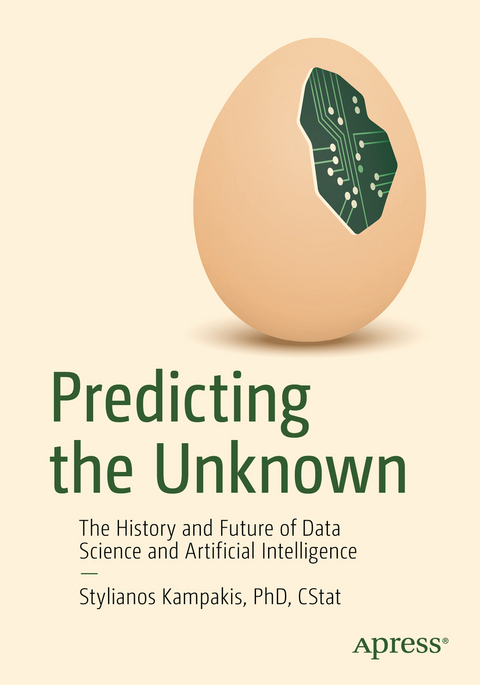
Predicting the unknown
Apress (Verlag)
978-1-4842-9504-5 (ISBN)
This book attempts to specifically cover this gap in literature between data science, machine learning and artificial intelligence (AI). How was uncertainty approached historically, and how has it evolved since? What schools of thought exist in philosophy, mathematics, and engineering, and what role did they play in the development of data science? It uses the history of data science as a stepping stone to explain what the future might hold.
Predicting the Unknown provides the framework that will help you understand where AI is headed, and how to best prepare for the world that’s coming in the next few years, both as a society and within a business. It is not technical and avoids equations or technical explanations, yet is written for the intellectually curious reader, and the technical expert interested in the historical details that can help contextualize how we got here.
What You’ll Learn
Explore the bigger picture of data science and see how to best anticipate future changes in that field
Understand machine learning, AI, and data science
Examine data science and AI through engaging historical and human-centric narratives
Who is This Book For
Business leaders and technology enthusiasts who are trying to understand how to think about data science and AI
Dr. Stylianos (Stelios) Kampakis is a data scientist, data science educator and blockchain expert with more than 10 years of experience. He has worked with decision makers from companies of all sizes: from startups to organizations like the US Navy, Vodafone ad British Land. His work expands multiple sectors including fintech (fraud detection and valuation models), sports analytics, health-tech, general AI, medical statistics, predictive maintenance and others. He has worked with many different types of technologies, from statistical models, to deep learning to blockchain and he has two patents pending to his name. He has also helped many people follow a career in data science and technology. He is a member of the Royal Statistical Society, honorary research fellow at the UCL Centre for Blockchain Technologies, a data science advisor for London Business School, and CEO of The Tesseract Academy and tokenomics auditor at Hacken. As a well-known data-science educator, he has published two books, both of them getting 5 stars on Amazon. His personal website gets more than 10k visitors per month, and he is also a data science influencer on LinkedIn.
Preface
Author’s note to the curious reader
Prologue
Chapter One – Where are we now? A brief history of uncertainty
Not all uncertainty is created equal
Chapter Two - Truth, logic and the problem of induction
The first black swan
Chapter Three - Swans and Space Invaders
Occam’s razor, space invaders and lizard people
Chapter Four - Probability: to Bayes, or not to Bayes?
Frequentist or Bayesian?
The formulation of Bayes’ theorem
After Laplace
Chapter Five - What’s Maths Got to do with it? The Power of Probability Distributions
Other Distribution Models
Issues with this view of uncertainty
Bounds and limits
Chapter Six - Alternative Ideas: Fuzzy Logic and Information Theory
Information Theory – Measuring Uncertainty
Chapter Seven – Statistics: the Oldest Kid on the Block
Descriptive vs Inferential Statistics
Hypothesis Testing: Significant or Not?
What the p?
Statistical modelling: A useful abstraction
Chapter Eight - Machine Learning: Inside the Black Box
Data Science and History of Machine Learning
Choose Your Learning Type: Supervised, Unsupervised, Reinforcement, or Other?
The Bias-Variance Trade-Off
Machine Learning vs Statistics: Why the ‘Dumb’ Approach Works
Machine Learning Shortcomings
Chapter Nine - Causality: Understanding the ‘Why’
How to Approach Causality?
Causality in our Mind
Chapter Ten - Forecasting, and Predicting the Future: The Fox and the Trump
A brief history of forecasting
Forecasting in practice: Newton and the madness of men, Trump, Brexit, and losing money through mathematical modelling
How to do forecasting: A story of foxes and hedgehogs
Chapter Eleven - The Limits of Prediction (part A): A futile Pursuit?
Learning theory: what can we know about what we don’t know?
Monte Carlo Simulations: What Does a Casino Have to do with Science?
Chapter Twelve - The Limits of Prediction (Part B): Game Theory, Agent-based Modelling and Complexity (Actions and Reactions)
Agent-based Modelling: Crafting artificial Worlds
Complexity Theory: Simulation vs the Limits of Prediction
Studying Complexity is a Complex Endeavour
Learning from Complexity: The Limits of Computation are the Limits of Uncertainty
Chapter Thirteen - Uncertainty in Us: How the Human Mind Handles Uncertainty
Uncertainty and our Mind
Uncertainty and our Brain
Chapter Fourteen - Blockchain: Uncertainty in transactions
The Internet of Trust
How Blockchain Works
From Crypto-Anarchism to Drug Trafficking: The unconventional Beginnings of an interesting Technology
I Can’t Trust you, but I Can Trust the Blockchain
Chapter Fifteen - Economies of Prediction: A New Industrial Revolution
Uncertainty brokers
Industries of incomplete Information
Prediction Industries and Automation
The global Economy against Uncertainty
Epilogue: The Certainty of Uncertainty
“Kampakis’ book clearly and readably covers the essence of uncertainty and the human efforts to address it, written for both professional data scientists and anyone attempting to predict life’s unknowable and unexpected outcomes.” (Harry J. Foxwell, Computing Reviews, November 29, 2023)
| Erscheinungsdatum | 21.06.2023 |
|---|---|
| Zusatzinfo | Illustrationen |
| Verlagsort | New York |
| Sprache | englisch |
| Maße | 178 x 254 mm |
| Gewicht | 544 g |
| Themenwelt | Informatik ► Theorie / Studium ► Algorithmen |
| Informatik ► Theorie / Studium ► Künstliche Intelligenz / Robotik | |
| Schlagworte | AI • Big Data • Blockchain • Data Science • data science for business leaders • data science for non-experts • machine learning • Statistical Modelling • Statistics • Uncertainty • Web 3.0 |
| ISBN-10 | 1-4842-9504-8 / 1484295048 |
| ISBN-13 | 978-1-4842-9504-5 / 9781484295045 |
| Zustand | Neuware |
| Haben Sie eine Frage zum Produkt? |
aus dem Bereich


